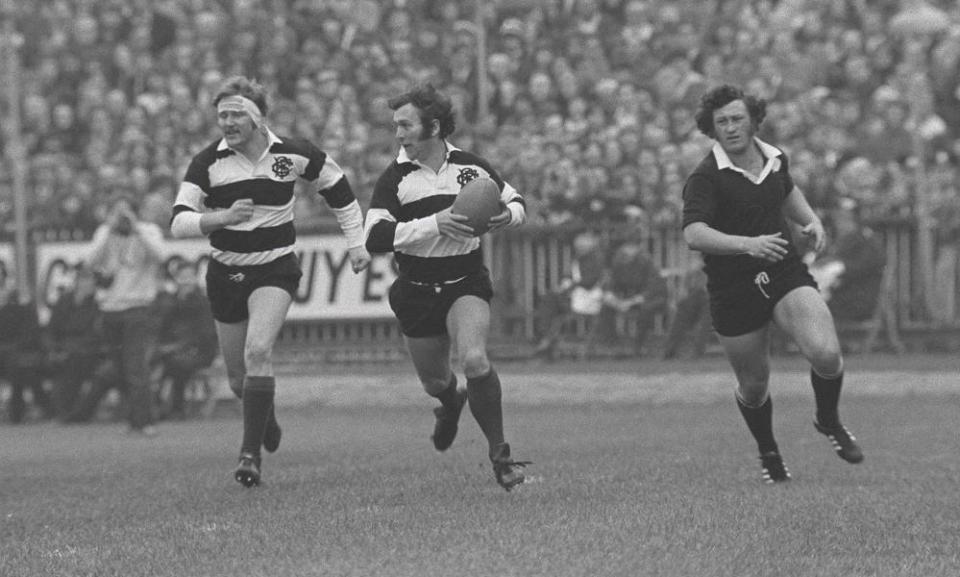John Dawes obituary
Although he was surrounded by some of the greatest players in the history of rugby union, John Dawes, who has died aged 80, seldom made the headlines himself. Instead he was a vital organising figure in a succession of great teams, captaining London Welsh, Wales, the Barbarians and the British Lions (as they were then known) to a series of notable victories.
His triumphs included a Five Nations grand slam in 1971, the only series victory to date by the Lions in New Zealand later that same year, and the Barbarians’ win over the All Blacks in Cardiff in 1973, when he was among the six players who handled the ball before Gareth Edwards sprinted for the line to touch down for what is still fondly recalled as one of the most joyously spectacular of tries.
Edwards, the nonpareil scrum-half, was one of a group of Welsh players whose genius found a platform in teams skippered by Dawes. Others included the magical fly-half Barry John, the uncatchable wing Gerald Davies, the fearless full-back JPR Williams and the rampaging No 8 Mervyn Davies.
Dawes himself played at centre threequarter, a good position from which to observe and assess the game and, like an expert mechanic oiling and adjusting a finely tuned engine, to ensure that the ball flowed easily between his colleagues. Not a prolific try-scorer at the highest level, he was nevertheless a master of the less obvious arts at a time when rugby was a game of evasion rather than collision.
When his playing days were over, he took to coaching at the highest level. He guided Wales to two further grand slams in 1976 and 1978, either side of a less happy return to New Zealand with the Lions, who lost the series 3-1. Later he became president of London Welsh, the club to which he had first applied his enlightened rugby philosophy.

Like many of his Welsh team mates, Dawes emerged from a coal-mining background. Born in Chapel of Ease, a Monmouthshire village close to the Ebbw River, he was the son of Gladys (nee Harris) and Reginald Dawes, a blacksmith at the nearby South Celynen colliery. While a pupil at Lewis school in Pengam, in the Rhymney Valley, he began training with Newbridge, a club then sufficiently prominent to have been included in the playing itinerary of a recent Springboks tour. He represented Newbridge while studying for a chemistry degree at University College Aberystwyth, switching from hooker to flank forward before settling on what became his permanent position in the centre.
He gained his teaching certificate at Loughborough Colleges before moving to London, taking a job at a school in Hounslow and joining London Welsh at Old Deer Park in Richmond. Appointed captain in 1965, he set about devising new tactics and calling the players in for training on two evenings a week rather than one. Proving that expressive, free-running rugby could be a winning proposition, and that forwards such as Mervyn Davies, Tony Gray and John Taylor could handle the ball as effectively as backs such as Gerald Davies and JPR, he transformed a previously humdrum outfit into the most feared club side in Britain.
Dawes scored a try on his international debut, a victory over Ireland at Lansdowne Road in 1964, and played in every match of the 1965 triple crown success, although his lack of outright speed left the selectors unconvinced. In and out of the side over the following seasons, it was not until 1970 that he was given the captaincy and allowed to do for the national side what he had done for London Welsh. A year later only 16 players were used as Wales claimed the grand slam, secured with a tense 9-5 win over France in the Stade Olympique de Colombes, the last of Dawes’ 22 caps.
A golden era was in full swing and Wales provided 13 members of the 34-strong Lions party to New Zealand that summer, seven of them from London Welsh, alongside Ireland’s Willie John McBride and Mike Gibson, Scotland’s Ian McLauchlan and England’s David Duckham.
With the visionary coach Carwyn James and the manager Doug Smith, Dawes, as captain, completed a management trio with views on the game that were in complete harmony. When the party arrived back at Heathrow after their 2-1 series win, they emerged into the arrivals hall to a welcome from thousands of fans, almost all of them Welsh.
Known to his team mates as “Syd” (his first name was Sydney, although he used his middle name, John), Dawes encouraged his players to be adventurous. If a pass went astray he would, according to team mate Barry John, say: “Don’t worry about it. Keep trying things.” He kept to that philosophy when, having hung up his boots, he succeeded Clive Rowlands as the Wales coach in 1975, although his return to New Zealand with the Lions was not a success.
Five years later, with the game still amateur, he accepted a salaried role as the Welsh Rugby Union’s coaching organiser. Made redundant in 1990, he took on the presidency of London Welsh, for whom his son, Michael, and grandson, Rhodri, both played.
He is survived by Michael and by his daughter, Catherine, both from his marriage to Janette Morris, which ended in the 1980s, and by his partner of 30 years, Jill Mathias.
• Sydney John Dawes, rugby player and coach, born 29 June 1940; died 16 April 2021

